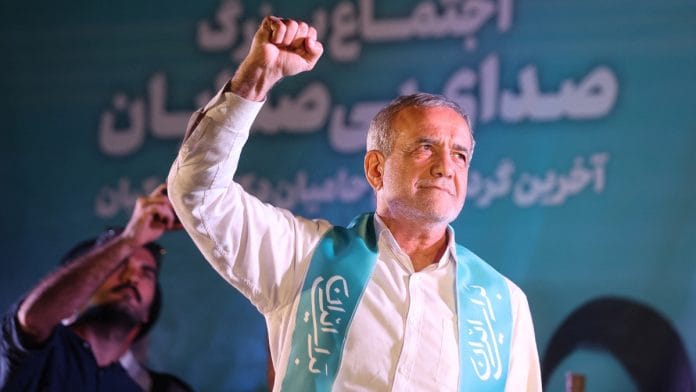New Delhi: Iran has elected Dr Masoud Pezeshkian, a reformist and centrist, as the country’s president in Friday’s run-off elections. Iran’s interior ministry confirmed Pezeshkian’s victory Saturday by securing 16.3 million votes, or 53.7 percent vote share, against hardliner Saeed Jalil’s 13.5 million.
Dr Pezeshkian’s victory, although by a narrow margin of less than 3 million votes, is noteworthy as he belongs to the Azeri community — a minority in Iran — and was considered the only moderate character out of the six vetted by the Guardian council and in the race to become president.
Calling his victory “the beginning of cooperation” with the Iranian people, Dr. Pezeshkian took to X to showcase his commitment towards the people of the country.
مردم عزیز ایران انتخابات تمام شد و این تازه آغاز همراهی ماست. مسیر دشوار پیش رو جز با همراهی، همدلی و اعتماد شما هموار نخواهد شد دستم را به سوی شما دراز میکنم و به شرافتم سوگند میخورم که در این راه تنهایتان نخواهم گذاشت. تنهایم نگذارید.
— Masoud Pezeshkian (@drpezeshkian) July 6, 2024
The 69-year-old is a surgeon and previously served as the country’s health minister between 2001 and 2005. He has represented the Tabriz, Osku, and Azarshahr electoral districts in the Iranian parliament.
Pezeshkian is known to support minority rights and has “criticised the clerical establishment’s suppression of political and social dissent,” Reuters reported. He was one of the very few politicians who demanded clarification on the death of a 22-year-old Kurdish woman Mahsa Amini in police custody in 2022 which led to widespread protests and riots against the imposition of hijab.
“I will do everything possible to look at those who were not seen by the powerful and whose voices are not heard. We will make poverty, discrimination, war, lies, and corruption disappear from this country,” Pezeshkian said during his campaign.
The Iranian elections took place in two phases — the ballot on 28 June and the run-off on 5 July. No one candidate secured a majority in the first round, leading to a fight between the top two candidates – Pezeshkian and Jalil in Friday’s elections. In the 28 June election, Pezeshkian received about 42.5 percent of votes and Jalili some 38.7 percent. Both phases saw low voter turnout with 40 percent on 28 June and slightly better 49.8 percent on 5 July.
The presidential elections, initially scheduled for 2025, were held earlier following the untimely death of former president Ebrahim Raisi in a plane crash in May this year.
On hijab, Palestine & reaching out to the West
Pezeshkian during his campaign has publicly stated that he will not propose any “radical changes” to the theocracy in the country and held that the Supreme leader is the final arbiter in all matters of state. In his campaign, however, he criticised the enforcement of mandatory hijab and, in his victory speech, the 71-year-old reformist, spoke about “reaching out to everyone.”
“People would expect social reform especially when it comes to women’s rights,” Dr Alvite Singh Ningthoujam, assistant professor at Symbiosis School of International Studies, told ThePrint. “How much leverage he would have given the influence of the supreme leader and other conservatives will have to be seen.”
“Raisi’s death came at a difficult juncture for Iran — both domestically and geopolitically. A volcano is ready to erupt in the country and it would be the new president’s top priority to get domestic affairs straight amid the crumbling economy, unemployment, and social unrest,” Ningthoujam added.
Iranian rials’ value has been depreciating, now around 42,000 to a dollar at the official rate and closer to 60,000 on the street. Inflation is at about 37 percent a year. Dr Pezeshkian vowed to work towards reviving the economy during his campaign.
In the current conflict between Israel and Palestine, countries like Iran and Turkey have shown support for the cause of Palestinians, and the new president will continue to do so. “It is also an opportunity for Iran to increase its political profile in the region,” Ningthoujam told ThePrint. However, any confrontation is less likely this early in his tenure. Pezeshkian will maintain the status quo with the Gulf, continuing trade. He will be careful to not rub shoulders with the Emirates and Saudis as Iran’s economy needs the Gulf’s support, he added.
The president-elect has also shown openness to nuclear negotiations with the West, framing the debate as an economic issue. However, “there is mistrust when it comes to the West” and the results of the US presidential election will have some influence on how Iran and the new president chart their foreign policy, Ningthoujam told ThePrint.
(Edited by Zinnia Ray Chaudhuri)
Also read: Le Pen’s investment in far-right Bardella pays off ahead of French election






